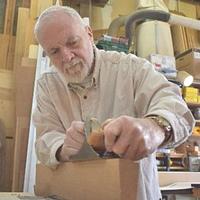
Bo Peep
in about 10 years
Building A Workbench
My good old faithful workbench (apparently it’s actually a potting bench) is showing signs of old age and neglect. I have been looking after it as best I can but it is a bit more rickety now and the surface is uneven due to damp conditions. So it is decided that I need to get a new one together and i am looking at building my own. Has anyone got any tips or advice on how I might go about this? I’m not sure if this is too big of a challenge for me to take on with my limited skill set and it would definitely be the biggest project I’ve come across so far. Another thing I should mention is apart from my scroll saw and cordless drill all of my tools are hand tools
?
9 Replies
Bo
Not everyone needs an elaborate workbench actually I’ve never owned a true woodworking bench even though I"m amazed at how wonderful they look with the great woods and outstanding dovetails, a good solid work table will work for you,yes you will not have some of the bells and whistles a nice bench wil give you,but you will have a good work area ,my work table is 4′×8′ made very simply with 4×4 for legs and screwed on 2×6 for the aprons and top cross supports basically the top is built like you would frame a wall but using deck screws instead of nails,then just screw the 4×4s to the corners. I then have a sheet of 3/4" melamine for the top. you can attach vises where every it works best for you.
woodworking classes, custom furniture maker
I agree with Jim, you can make a good bench with lumber yard dimensional lumber. There are a lot of good plans floating around on the internet that use dimensional lumber that is simply glued and screwed together. Not everyone has to have a Roubo :) The most functional part of the workbench will be ensuring you have a good vise and that the bench is solid enough for the work you do.
Making a workbench is a great project to expand handtool skills; it’s a lot of work but great experience at jointing and planing for the top, as well as doing some large mortise and tenon joints for the base.
Rob, Sault Ste. Marie, Ontario
You might want to have a look at this one. I think it might suit you. The basic bench is a brute for strength and rigidity, is made from readily available plywood, and can be built with not much more than a skilsaw and a hammer.
Project post:https://woodworkingweb.com/creations/2658-outside-the-box-workbench-this-one-is-different
Build blog: https://woodworkingweb.com/entries/891-some-
features-and-operational-videos
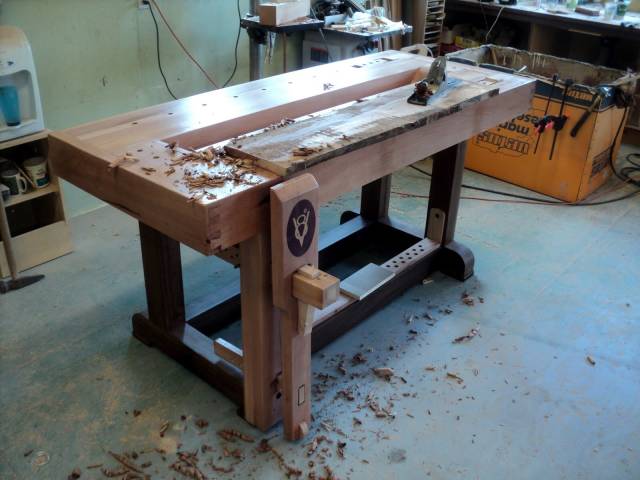
The early bird gets the worm but its the second mouse that gets the cheese.
My biggest tips are leave a lip and wheels! Unlike some of these guys i dont have a big workshop i have a garage, and so all my stuff has to be mobile, so i installed wheels on mine. I would love a table like Shipwright i just dont see it making sense for me. Once i have a dedicated shop then yes for sure, but for now this will have to do. So my tips, leave a lip, makes it easier to clamp. Wheels, go for bigger wheels i think i have 2 1/2" on mine and with weight they get stuck, i plan on making a new one and will go with 3 1/2 or 4" wheels. The top is a 4×8 sheet of ply wood and the frame is about 2-3 smaller on the sides.
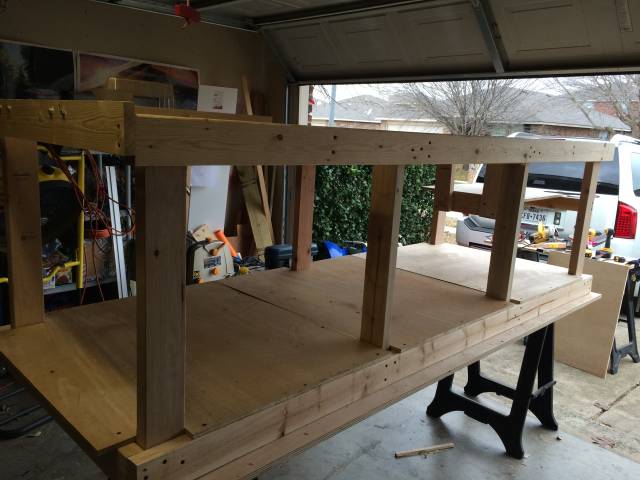
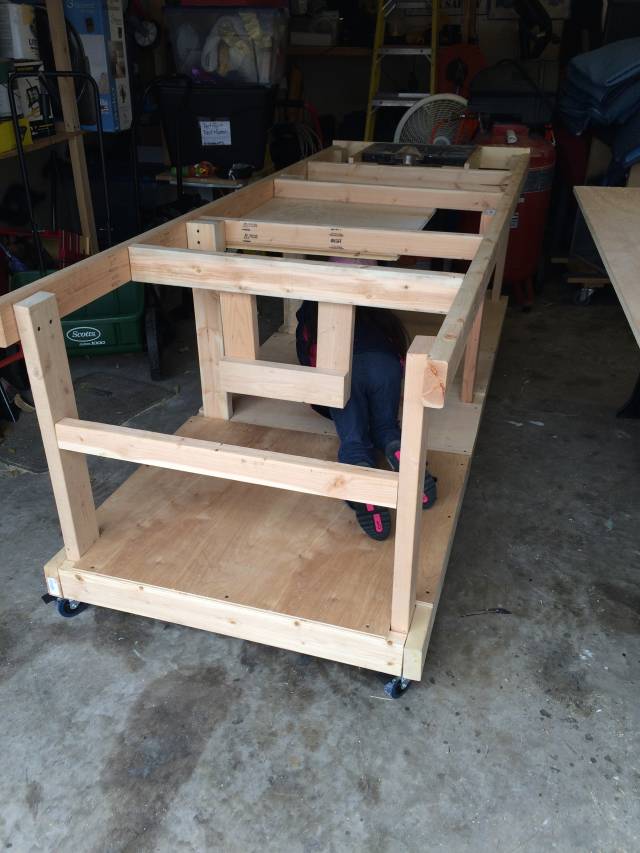
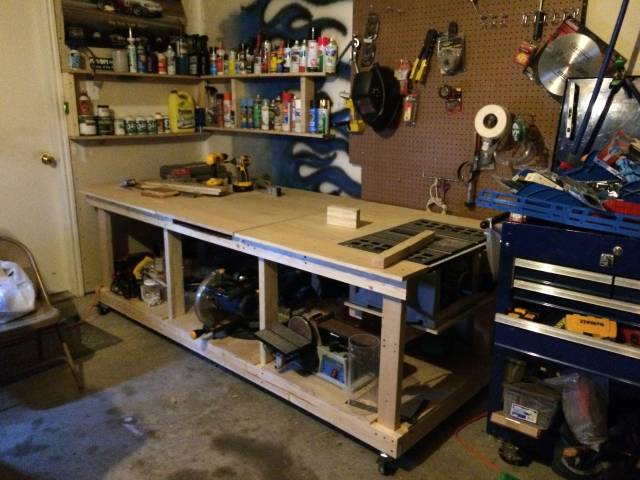
Thank you everyone for your comments. I agree it doesn’t need to be anything too fancy with all the bells and whistles and I like the idea of the wheels because I will be moving it once I have a more permanent workspace. I will have a look at the links and I’ve found some useful YouTube videos too. So over the next few months as money and time allows I think I will actually attempt to make one. It can only teach me more and build my confidence with bigger projects
?
I agree with nearly all of the above recommendations… rigidity being the most important. On that note, I now disagree about adding wheels, though I originally thought about doing so myself.
IMO, if considering wheels, they should be “retractable” (NOT locking type) in order keep the bench from moving while in use, especially when using non-powered hand tools.
My workbench weighs ~550lb, but while standing on a concrete slab, I can move/scoot the bench a few inches at a time even though that is difficult to do. The lesson here is that you need to take into consideration your shop floor characteristics and just how much you will “need” to move it around.
HorizontalMike
Thinking about it I agree with you about the wheels Mike as I won’t need to move the bench around all that much. My current bench is against the wall so it doesn’t move all that much on the floor. Whitacre I am indeed in the UK and I will see about fixing up my old faithful. I’ve got a really busy work schedule at the moment so not much free time. I hadn’t taken into consideration the height being of such relevance so thank you for the heads up on that one
?
all great suggestions so far. Wheels are key in small spaces, also on my table I built in 2 drop down extensions for 6’ more space to work. My build is here
https://woodworkingweb.com/entries/698-idea-and-progress-so-far
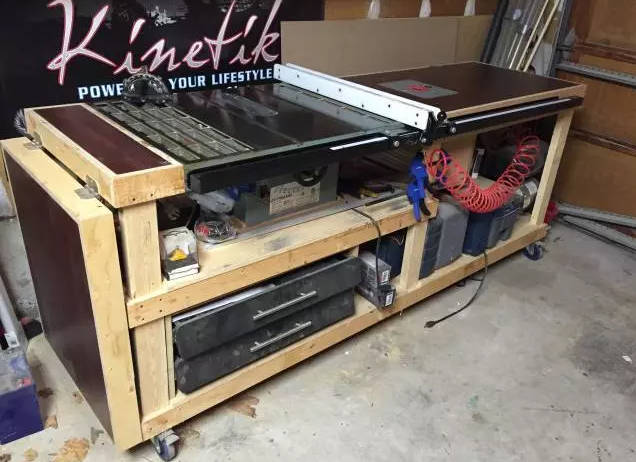
If you dont like what you can buy, build it.
Thank you. I like theBay drop down extensions that is an ace idea! I’m in two minds about the wheels as once it’s in place I won’t need to move it all that much but as it’s been pointed out in small spaceselection it makes things easier to move around when needed. I’m also terrible for reorganising and changing things around every so often
?









